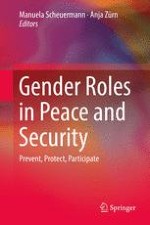2020 | OriginalPaper | Buchkapitel
Women, Peace and Security Organisations: Gender Norms and NATO
verfasst von : Nina Wüstemann
Erschienen in: Gender Roles in Peace and Security
Verlag: Springer International Publishing
Aktivieren Sie unsere intelligente Suche, um passende Fachinhalte oder Patente zu finden.
Wählen Sie Textabschnitte aus um mit Künstlicher Intelligenz passenden Patente zu finden. powered by
Markieren Sie Textabschnitte, um KI-gestützt weitere passende Inhalte zu finden. powered by
